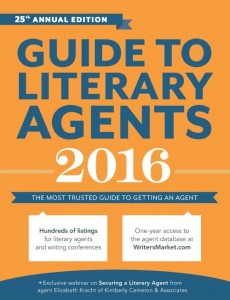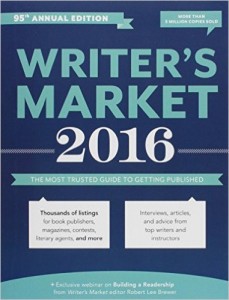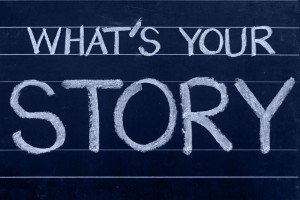Who should you send a query letter to?
 Agents – If you are writing fiction, memoir, or a children’s books, you must have an agent who will represent your work to publishers.
Agents – If you are writing fiction, memoir, or a children’s books, you must have an agent who will represent your work to publishers.- Publishers – If you are writing nonfiction or poetry, you can query the publisher.
TIP: Research the agency or publisher. Visit their website and check their submission guidelines.
How do I find agents or publishers who will be interested in my book project?
There are lots of useful sites which can help you identify the right agent or publisher for your writing. Here are some you may find useful.
- AgentQuery.com
- QueryTracker.net
- WritersMarket.com
- ManuscriptWishList.com
- Poets & Writers Guide to Literary Agents

 Writer’s Market publishes two annual reference guides to finding agents and publishers you should consult. Guide to Literary Agents 2016 edited by Chuck Sambuchino includes sample query letters, informative articles, success stories, features on new agents, and listings for more than a thousand literary agents. Writer’s Market 2016 edited by Robert Lee Brewer includes far more than listings for book publishers. They also provide up-to-date information on consumer and trade magazines, contests and awards, lists of professional writing organizations, and timely articles related to the business of being a writer.
Writer’s Market publishes two annual reference guides to finding agents and publishers you should consult. Guide to Literary Agents 2016 edited by Chuck Sambuchino includes sample query letters, informative articles, success stories, features on new agents, and listings for more than a thousand literary agents. Writer’s Market 2016 edited by Robert Lee Brewer includes far more than listings for book publishers. They also provide up-to-date information on consumer and trade magazines, contests and awards, lists of professional writing organizations, and timely articles related to the business of being a writer.
Some of the best ways to find the right agent for book include looking at comparable books to yours and seeing who the publishers are and reading the acknowledgements to see which editors worked with the author and which agent, if any, represented their work. Attend writing conferences and workshops and network with other writers who may share their connections to editors and agents. Join professional writing associations and organizations — Society of Children’s Book Writers & Illustrators, Association of Writers & Writing Programs, Science Fiction & Fantasy Writers Association, Romance Writers of America, Poetry Society of America, Academy of American Poets, etc. Consult their websites and participate in their programs and activities.
TIP: Do not send out a mass mailing to agents or publishers. Customize your query letter to the submission guidelines specified by each person you write.
When should you send a query letter?
If you are writing fiction, memoir, YA or children’s books wait to query until you have a finished manuscript and have written a book proposal.
For nonfiction or poetry, send a query when you have a book proposal and a polished writing sample.
Keep in mind the publishing industry has two “seasons” for pitching and acquiring new manuscripts. Between Labor Day and Thanksgiving is the fall season. Don’t send anything between Thanksgiving and the end of January. The spring season starts in February and runs through mid-May. Don’t bother to send anything during the month of August.
TIP: Don’t let your horse out of the gate prematurely or you’ll be disqualified from the race. If you send a query letter but haven’t written a book proposal or polished your writing, then when an agent or editor is interested you aren’t prepared to strike while the iron is hot.
What goes into a query letter?
There should be four paragraphs. No more than one page.
 The first graf is crafted for a specific recipient. Do your homework on this person. Read their bio, check out their social media postings, read their blog, learn what recent projects they have published and acquaint yourself with their client list. Look at their profile on LinkedIn. Read the trade news coverage about this person. Your first paragraph needs to explain why you think this person will want your book project. Did you go to the same college or university? Are you from the same hometown? Did you watch a YouTube interview with this person? Read an article they published? Were they referenced in the Acknowledgements of a book you finished reading? Did your Uncle Henry go to high school with his sister? It’s about making a connection with the person.
The first graf is crafted for a specific recipient. Do your homework on this person. Read their bio, check out their social media postings, read their blog, learn what recent projects they have published and acquaint yourself with their client list. Look at their profile on LinkedIn. Read the trade news coverage about this person. Your first paragraph needs to explain why you think this person will want your book project. Did you go to the same college or university? Are you from the same hometown? Did you watch a YouTube interview with this person? Read an article they published? Were they referenced in the Acknowledgements of a book you finished reading? Did your Uncle Henry go to high school with his sister? It’s about making a connection with the person. The second graf is your pitch and premise. What is your book about? Your Hollywood pitch, 30-second elevator speech, the bait and hook. Who cares? So what? Your premise is the central idea, situation, or set-up which provides the foundation and pushes the narrative forward. It’s usually one sentence. “What if a group of school boys stranded on a desert island work to govern themselves?” or “When Dorothy is caught up in a Kansan tornado, she visits a magical place called Oz, only to discover there’s no place like home.” Perhaps another way to get a handle on the premise of your book is to determine its main point or take-away lesson. The premise should be brief, provocative, and include the central characters, a conflict, and a hook. It should pull the reader in and leave them begging to know more. It should reveal a larger world and contain universal appeal. Write your premise statement in present tense and with clarity.
The second graf is your pitch and premise. What is your book about? Your Hollywood pitch, 30-second elevator speech, the bait and hook. Who cares? So what? Your premise is the central idea, situation, or set-up which provides the foundation and pushes the narrative forward. It’s usually one sentence. “What if a group of school boys stranded on a desert island work to govern themselves?” or “When Dorothy is caught up in a Kansan tornado, she visits a magical place called Oz, only to discover there’s no place like home.” Perhaps another way to get a handle on the premise of your book is to determine its main point or take-away lesson. The premise should be brief, provocative, and include the central characters, a conflict, and a hook. It should pull the reader in and leave them begging to know more. It should reveal a larger world and contain universal appeal. Write your premise statement in present tense and with clarity. The third paragraph will provide your qualifications as an author. Why are you the best person to write this book? Mention where your work has previously been published; what writing conferences, residencies, and workshops you have attended; and any awards you have received. For nonfiction writers, provide your qualifications as an authority or expert on your subject. Identify the audience and how you are engaged in reaching these readers to turn them into book buying customers.
The third paragraph will provide your qualifications as an author. Why are you the best person to write this book? Mention where your work has previously been published; what writing conferences, residencies, and workshops you have attended; and any awards you have received. For nonfiction writers, provide your qualifications as an authority or expert on your subject. Identify the audience and how you are engaged in reaching these readers to turn them into book buying customers.- The fourth and final paragraph provides the specifics of word count/pages, status and availability of the manuscript, and your contact information.
TIP: Be sure to copyedit your query letter before you send it. Make sure you have spelled the name of the agent or editor correctly.
How long should I wait for a response?
 If an agent or publisher is interested, you will get a response to your query letter within two weeks.
If an agent or publisher is interested, you will get a response to your query letter within two weeks.
No response is a no. A ‘no’ suggests you revisit your query and rework it to get a yes.
If you get a ‘yes,’ you will be asked to send a proposal. Immediately.
Never send a full manuscript unless you are requested to do so in writing.
“No unsolicited manuscripts” does not mean “don’t send me a query letter first.”
TIP: A query letter should entice its reader to want to know more. A positive response to a query letter is like a first date. Establish a relationship first before you jump into bed with the first offer you get. Make sure there is a good match for you and your book.
